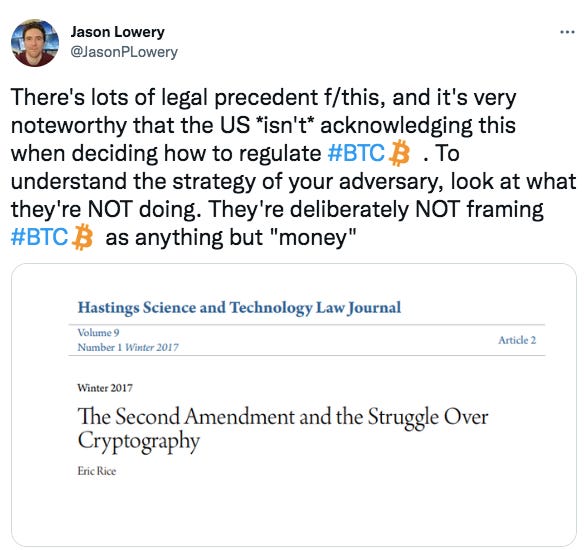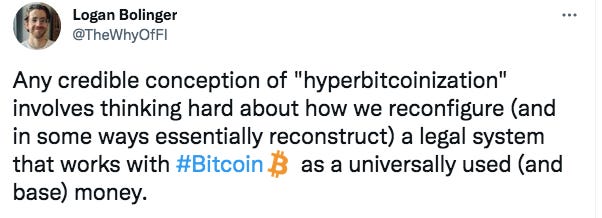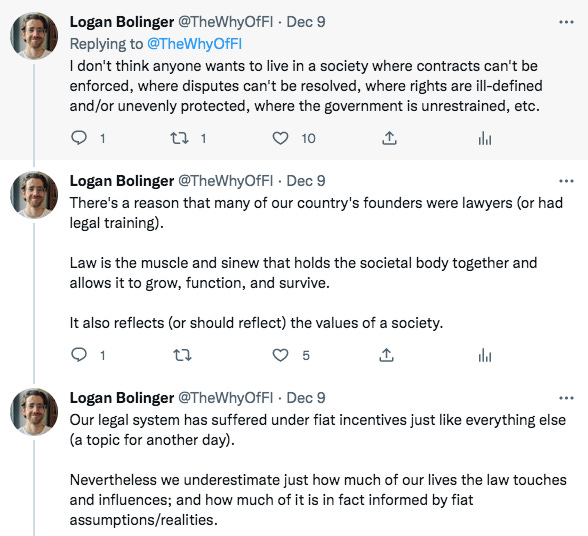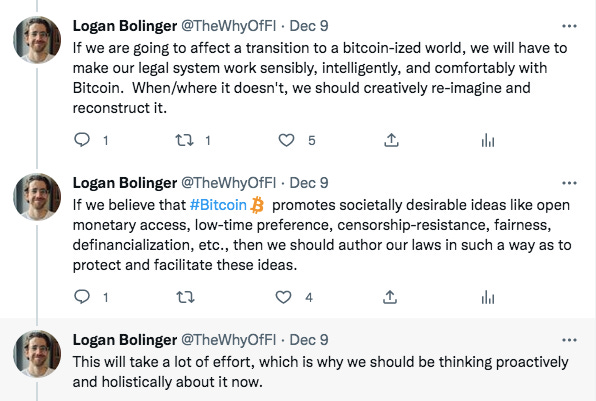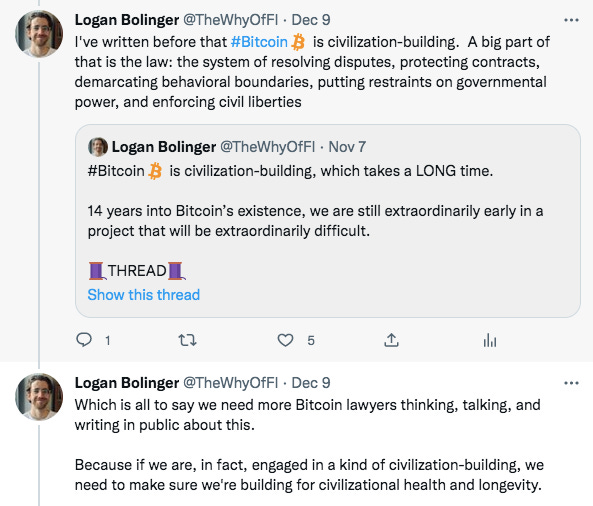Bitcoin and the Second Amendment
Think Bitcoin™ Issue #46
Hey friends, welcome back to Think Bitcoin™ for issue #46. Special welcome to the new subscribers. I’m glad you’re here. As always, if you have any questions or comments, feel free to reach out. You can also find me on Twitter (@TheWhyOfFI) and connect with me on LinkedIn.
In this issue:
Long Reads: Bitcoin and the Second Amendment
Threads: On the importance of thoughtfully reconstructing our legal system to work effectively with Bitcoin
Content Round-Up: 3 podcasts, 1 article
As always, if you find this newsletter interesting or useful, please share it with others who might find it interesting or useful, too!
This issue is sponsored by Orange Pill App. Connecting with other Bitcoiners is a great experience. Many of my own most interesting conversations each day occur with fellow Bitcoiners. Whether in real life or online, you can skip formalities and get right to discussing the transformative, wide-ranging effects of Bitcoin’s growth, knowing you share a hope for a more promising future. Thanks to Orange Pill App you are now able to meet Bitcoiners near you without the need to go to a meet-up or a conference. Sign up now!
Long Reads
Bitcoin and the Second Amendment
Two weeks ago on Twitter Jason Lowery made a somewhat dramatic fuss about why bitcoin mining should be considered a weapon and, consequently, why the Second Amendment should protect it.
Before I start I’ll just say that I generally find Jason’s ideas valuable and useful to think about, and I’m not here to assert that he is descriptively incorrect. What I want to do is disentangle the descriptively interesting insights from their legal implications. Perhaps another way of saying this is I want to surface some of the unintended consequences that could emerge if some of his ideas are brought to fruition.
To begin with the conclusion: I think courting classification as a weapon and promulgating a wartime framework around bitcoin mining is a bad idea. It’s a bad idea for a number of constitutional and legal reasons. First, the Second Amendment has meaningful limitations and a narrower ambit of protection than most people think. Second, once something is classified as a war material, myriad executive and legislative powers become relevant and usable, many of which could have unpredictable and, perhaps, significantly deleterious effects on bitcoin mining in the U.S.
Now let’s back up and start with the 2A (my shorthand for “Second Amendment”). Even if bitcoin mining were to be deemed a weapon, there is zero guarantee that the 2A would protect it from governmental intervention or restrictions.
In thinking that automatic 2A protection would ensue upon classification as a weapon and, Jason makes the same mistake most of the non-lawyer population makes about the 2A. This mistake is the assumption that the 2A offers broad protection and has very few limitations. The reality is that this is not true. As the late Justice Scalia wrote in District of Columbia v. Heller:
“There seems to us no doubt, on the basis of both text and history, that the Second Amendment conferred an individual right to keep and bear arms. Of course the right was not unlimited, just as the First Amendment ’s right of free speech was not, see, e.g., United States v. Williams, 553 U. S. (2008). Thus, we do not read the Second Amendment to protect the right of citizens to carry arms for any sort of confrontation, just as we do not read the First Amendment to protect the right of citizens to speak for any purpose.”
And, later in that opinion:
“Like most rights, the right secured by the Second Amendment is not unlimited. From Blackstone through the 19th-century cases, commentators and courts routinely explained that the right was not a right to keep and carry any weapon whatsoever in any manner whatsoever and for whatever purpose.”
Responding to criticism about the dubious legal basis for his 2A claims, Jason declared that there was lots of “precedent” for his claims and then cited a single law review article.
There are a few important things worth noting here for those who are not practicing attorneys with law degrees. First, a law review article is not “precedent.” Second, just because a law review article cites some cases (they all do) does not mean that those cases are on point or stand for the legal proposition for which the author is arguing. A law review article, in and of itself, has zero precedential value from a legal perspective.
“Precedent,” from a legal perspective, means judge’s opinions, i.e. case law. In the American legal system, judges (and, ultimately, the Supreme Court) say what the law is (for those interested, this is the canonical Marbury v. Madison case). Opinions issued from certain courts are binding and precedential. Opinions from others are not. Obviously, Supreme Court opinions are binding everywhere.
But again, a law review article is not precedent.
Next, it’s worth saying a few things about how law reviews work. Basically every law school publishes a handful of journals. They are staffed by law students and some, as you can imagine, are much more prestigious than others. Students, faculty, and legal scholars submit articles to various law reviews for publication. The articles are reviewed by the student staff, and some are selected for publication.
Now, if you’re a scholar trying to publish your research in a law review, you want to do it in the most prestigious law review journal that you can. The better the law school (think Harvard, Yale, etc.) the better the law review. Just being brutally honest, if your law review article is published in a lower-tier journal from a lower-tier school, it doesn’t carry the weight of one published in a more elite journal. And at the risk of sounding repulsively condescending, the article in question here was published in the journal of a middling law school. Not exactly something you wave around as biblical authority.
This particular article basically hinges on the assertion, near the beginning, that “self-defense” is “not possible without cryptography” and that “arms” in the text of the 2A can and should be read to encompass “cryptography.” These are big claims. It’s not clear at all that “self-defense,” from a 2A perspective, includes protection of property or privacy (one’s data, one’s private information, one’s anonymity, etc.) As descriptively or abstractly true as it might be to claim that modern self-defense in cyberspace requires cryptography, it does not mean a federal judge (or, more specifically, a Supreme Court, comprised of mostly conservative justices and lots of originalist energy) will read that into the 2A. Federal judges are not sitting in their chambers listening to Robert Breedlove podcasts. Their job is to say what the law is - which is not always what we would like it to be.
If you read the Heller case, I think it’s actually hard to imagine the 2A encompassing something like bitcoin mining. Heller essentially held that, in addition to protecting the right to keep and bear arms in connection with militia service, the 2A also protects the right to keep and bear some (but not all) arms in the home for the purpose of self-defense. Bitcoin mining is not self-evidently related to self-defense in the way that 2A jurisprudence conceptualizes self-defense. And most mining does not occur in the home anyway. It’s hard to see how it falls into the right to keep certain arms for self-defense in the home without several layers of abstraction. Bitcoin mining is also obviously not related to participation/service in a militia.
Additionally, Justice Scalia enumerates some specific limitations on 2A protection, among them:
“We also recognize another important limitation on the right to keep and carry arms. Miller said, as we have explained, that the sorts of weapons protected were those “in common use at the time.” 307 U. S., at 179. We think that limitation is fairly supported by the historical tradition of prohibiting the carrying of “dangerous and unusual weapons.”
Would we consider bitcoin mining an “unusual weapon,” if we consider it a weapon?
TLDR on this point is that when Jason says there’s “lots of legal precedent f/this,” there actually isn’t. The article itself admits as much. And, more importantly, it’s not clear at all that the 2A would protect bitcoin mining, EVEN IF it was considered a weapon.
Bitcoiners eager to get bitcoin mining classified as some kind of arm or, worse, an instrument of war and geopolitical conflict have much more to worry about than 2A disappointment, however.
As soon as something is considered a “war material” or considered just generally essential to to the waging of war (whether that is a hot/hard war or Lowery’s “soft war” idea), both the President and Congress have more power with respect to regulation and direction of/over it.
As Storm Rund has pointed out, there’s already a law in the U.S. code that grants the President broad executive power over anything considered to be a “war material” or a “factory” in times of war. Here are the statutory definitions of those two terms:
“The words “war material” shall include arms, armament, ammunition, stores, supplies, and equipment for ships and airplanes, and everything required for or in connection with the production thereof. The word “factory” shall include any factory, workshop, engine works, building used for manufacture, assembling, construction, or any process, and any shipyard or dockyard.”
As you can see, “war material” includes “arms, armament…and everything required for or in connection with the production thereof.” So, if bitcoin mining or bitcoin is comes to be considered an “arm” or “armament,” then mining facilities also likely fall into this definition. There’s also the definition of “factory,” which is very broad and includes any “building used for…any process.” Bitcoin mining facilities likely fall within this pretty broad definition, too.
Why is this potentially a problem? Because in wartime, the President has pretty broad power over these things. So if governments around the world lean into Lowery’s ideas and start using hash power geostrategically and we end up with a hard or soft war that in some direct or tangential way involves bitcoin mining, the risks of hash power nationalization or governmental co-option of institutional hash power rise.
It’s worth pasting the exact language of the statute regarding what power the President has over “war material” and “factories” in times of war. Pay close attention to where you see those words:
(b)Presidential powers
In time of war the President is authorized and empowered, in addition to all other existing provisions of law:
First. Within the limits of the amounts appropriated therefor, to place an order with any person for such ships or war material as the necessities of the Government, to be determined by the President, may require and which are of the nature, kind, and quantity usually produced or capable of being produced by such person. Compliance with all such orders shall be obligatory on any person to whom such order is given, and such order shall take precedence over all other orders and contracts theretofore placed with such person. If any person owning, leasing, or operating any factory equipped for the building or production of ships or war material for the Navy shall refuse or fail to give to the United States such preference in the execution of such an order, or shall refuse to build, supply, furnish, or manufacture the kind, quantity, or quality of ships or war material so ordered at such reasonable price as shall be determined by the President, the President may take immediate possession of any factory of such person, or of any part thereof without taking possession of the entire factory, and may use the same at such times and in such manner as he may consider necessary or expedient.
Second. Within the limit of the amounts appropriated therefor, to modify or cancel any existing contract for the building, production, or purchase of ships or war material; and if any contractor shall refuse or fail to comply with the contract as so modified the President may take immediate possession of any factory of such contractor, or any part thereof without taking possession of the entire factory, and may use the same at such times and in such manner as he may consider necessary or expedient.
Third. To require the owner or occupier of any factory in which ships or war material are built or produced to place at the disposal of the United States the whole or any part of the output of such factory, and, within the limit of the amounts appropriated therefor, to deliver such output or parts thereof in such quantities and at such times as may be specified in the order at such reasonable price as shall be determined by the President.
Fourth. To requisition and take over for use or operation by the Government any factory, or any part thereof without taking possession of the entire factory, whether the United States has or has not any contract or agreement with the owner or occupier of such factory.
Now of course in theory (and to avoid violating the Takings Clause) one would be entitled to “just compensation” for any such co-option, seizure, cancellation of a contract, etc. enacted pursuant to this statute. But truly just compensation in these situations is chimerical. It’s not happening.
If such a scenario unfolded with respect to bitcoin mining, it would be a version of FDR’s Executive Order 6102 (for which “just compensation” was also theoretically paid).
People worry so much about whether or not their own personal stack of bitcoin can be seized and not nearly enough about whether mining operations can be nationalized or co-opted, and the implications thereof, particularly in a time of de facto or de jure war.
How can we avoid some of these downstream issues and questions? We can start by not framing Bitcoin or mining as war-related activities. We can also maybe stop proactively seeking classification as an “arm” to preemptively argue protection under the 2A.
We actually do have legal precedent that code is speech and therefore subject to First Amendment protections. And there are other Amendments that can, in theory, lend some protection to Bitcoin and bitcoin mining if a case or controversy arises.
In sum, I think the route of pursuing legal classifications in line with a conception of Bitcoin as anything related to arms or war is a be-careful-what-you-wish-for undertaking.
If you’re interested in more on this topic check out the first podcast in the Content Round-Up below.
Threads
Content Round-Up
1. “The Real 6102 and the Second Amendment,” an episode of the Difficulty Adjusted podcast with yours truly, Storm Rund, and Arceris. Storm and I connected after we both exchanged comments with Jason Lowery on his 2A ideas. Arceris chimed in, as well, and we decided it would be a good idea to put three lawyers on a podcast to discuss the legal implications of Jason’s ideas.
2. “Fighting the Bitcoin Mining FUD,” and episode of the What Bitcoin Did podcast with Troy Cross. This is one of my favorite podcast episodes in recent memory. The title is somewhat misleading, as Troy characteristically covers quite a bit beyond energy and bitcoin mining. I particularly enjoyed his take on epistemology and the Bitcoin community. At the end he explains an fascinating insight that led him to worry less about Bitcoin’s long-term security budget.
3. “Bitcoin is a Pioneer Species,” an episode of the What Bitcoin Did podcast with Brandon Quittem. Normally I try not to share multiple pieces of content from the same source, but the caliber of conversations on What Bitcoin Did lately has been top notch. Brandon’s a great writer, and you should check out his work if you haven’t already.
4. “Structural Adjustment: How the IMF and the World Bank Repress Poor Countries and Funnel Their Resources to Rich Ones,” an article by Alex Gladstein. I read whatever Alex writes, and I recommend others do the same.
As always, thanks for reading! If you enjoyed it or found it useful, share this newsletter widely and freely!
“Civilization is in a race between education and catastrophe. Let us learn the truth and spread it as far and wide as our circumstances allow. For the truth is the greatest weapon we have.” -H.G. Wells
See you in next time,
Logan
SPONSORSHIP INQUIRIES: If you’re a Bitcoin company (or you work for a Bitcoin company) and you’re interested in supporting the newsletter, please reach out via Twitter DMs (@TheWhyOfFI) or email (askthewhyoffi@gmail.com).
SUPPORT
Send bitcoin to my Strike
SOCIAL
DISCLAIMER: I am not investment advisor and this is not investment advice. This is not, nor is it intended to be, a recommendation to buy or sell any security or digital asset. Nothing in this newsletter should be interpreted as a solicitation, a recommendation, or advice to buy or sell any security or digital asset. Nothing in this newsletter should be considered legal advice of any kind. This newsletter exists for educational and informational purposes only. Do your own research before making any investment decisions.
© Copyright Logan Bolinger, Think Bitcoin LLC



